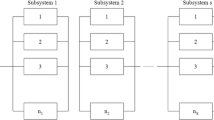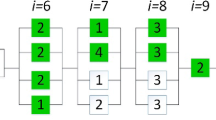Abstract
Redundancy allocation problem includes selection of several redundant components for allocating to a system; to maximize the availability, by considering the system constrains. In this regard, traditional prioritization methods have been presented which mainly addressed single-objective optimization. Moreover, the presented methods, due to have high number of solutions, are practically limited and selection of the best solution among the efficient solutions is typically complicated. In this study, the availability and the cost of system are regarded as objective functions. The corrective maintenance and all-unit discount for buying the substituted components are considered in the model. To optimize the presented model, a solution prioritizing method with utility function and ant colony optimization will be presented. The method is a robust one in the case of existence of a relationship between availability and system cost. Finally, the corrective maintenance and all-unit discount of the proposed method will be investigated and the results will be examined in a numerical example.



Similar content being viewed by others
References
Agarwal M, Sharma VK (2010) Ant colony approach to constrained redundancy optimization in binary systems. Appl Math Model 34:992–1003
Bulfin RL, Liu CY (1985) Optimal allocation of redundancy components for large systems. IEEE Trans Reliab 34:241–247
Busacca PG, Marseguerra M, Zio E (2001) Multiobjective optimization by genetic algorithms: application to safety systems. Reliab Eng Syst Saf 72:59–74
Chern MS (1992) On the computational complexity of reliability redundancy allocation in a series system. Oper Res Lett 11:309–315
Fiori de Castro H, Cavalca K (2005) Maintenance resources optimization applied to a manufacturing system. Reliab Eng Syst Saf 91:413–420
Fyffe DE, Hines WW, Lee NK (1968) System reliability allocation problem and a computational algorithm. IEEE Trans Reliab 17:64–69
Garg H, Sharma SP (2013) Multi-objective reliability-redundancy allocation problem using particle swarm optimization. Comput Ind Eng 64:247–255
Harrington E (1965) The desirability functions. Ind Qual Control 12:494–498
Hwang CL, Tillman FA, Kuo W (1979) Reliability optimization by generalized Lagrangian-function and reduced-gradient methods. IEEE Trans Reliab 28:316–319
Ighravwe DE, Oke SA (2017) A manufacturing system energy-efficient optimisation model for maintenance-production workforce size determination using integrated fuzzy logic and quality function deployment approach. Int J Syst Assur Eng Manag 8(4):683–703
James AT, Gandhi OP, Deshmukh SG (2017) Assessment of failures in automobiles due to maintenance errors. Int J Syst Assur Eng Manag 8(4):719–739
Jian-Hua Z, Zhaoheng L, My-Thien D (2007) Reliability optimization using multiobjective ant colony system approaches. Reliab Eng Syst Saf 92:109–120
Kayedpour F, Amiri M, Rafizadeh M, Shahryari Nia A (2017) Multi-objective redundancy allocation problem for a system with repairable components considering instantaneous availability and strategy selection. Reliab Eng Syst Saf 160:11–20
Khalili-Damghani K, Amiri M (2012) Solving binary-state multi-objective reliability redundancy allocation series-parallel problem using efficient epsilon-constraint, multi-start partial bound enumeration algorithm, and DEA. Reliab Eng Syst Saf 103:35–44
Khalili-Damghani K, Abtahi A, Tavana M (2013) A new multi-objective particle swarm optimization method for solving reliability redundancy allocation problems. Reliab Eng Syst Saf 111:58–75
Khalili-Damghani K, Abtahi AR, Tavana M (2014) A decision support system for solving multi-objective redundancy allocation problems. Qual Reliab Eng Int 30:1249–1262
Kuo W, Prasad VR (2000) An annotated overview of system-reliability optimization. IEEE Trans Reliab 49:176–187
Kuo W, Wan R (2007) Recent advances in optimal reliability allocation. IEEE Trans Syst 37:143–156
Kuo W, Prasad VR, Tillman FA, Hwang CL (2000) Optimal reliability design: fundamentals and applications. Cambridge University Press, Cambridge
Liang Yun-Chia (2004) An ant colony optimization algorithm for the redundancy allocation problem. IEEE Trans Reliab 53:417–423
Misra K, Sharma U (1991) An effective approach for multiple criteria redundancy optimization problems. Microelectron Reliab 31:303–321
Mokhtari H, Dadgar M (2015) Scheduling optimization of a stochastic flexible job-shop system with time-varying machine failure rate. Comput Oper Res 61:31–45
Mokhtari H, Mozdgir A, Kamal Abadi IN (2012) A reliability/availability approach to joint production and maintenance scheduling with multiple preventive maintenance services. Int J Prod Res 50(20):5906–5925
Mousavi SM, Hajipour V, Niaki ST, Alikar N (2013) Optimizing multi-item multi-period inventory control system with discounted cash flow and inflation: two calibrated meta-heuristic algorithms. Appl Math Model 37:2241–2256
Mousavi M, Alikar N, Niaki T, Bahreininejad A (2015) Two tuned multi-objective meta-heuristic algorithms for solving a fuzzy multi-state redundancy allocation problem under discount strategies. Appl Math Model 39:6968–6989
Nakagawa Y, Miyazaki S (1981) Surrogate constraints algorithm for reliability optimization problems with two constraints. IEEE Trans Reliab 30:175–180
Pasandideh SHR, Niaki STA, Mousavi SM (2013) Two metaheuristics to solve a multi-item multiperiod inventory control problem under storage constraint and discounts. Int J Adv Manuf Technol 69:1671–1684
Pourkarim P, Azimi P, Niaki T, Niaki A (2016) Redundancy allocation problem of a system with increasing failure rates of components based on Weibull distribution: a simulation-based optimization approach. Reliab Eng Syst Saf 152:187–196
Ramakumar R (1993) Engineering reliability. Prentice-Hall, Englewood Cliffs, NJ, p 482
Raviprabakaran V, Subramanian RC (2018) Enhanced ant colony optimization to solve the optimal power flow with ecological emission. Int J Syst Assur Eng Manag 9(1):58–65
Salmasnia A, Yazdekhasti A (2017) A bi-objective model to optimize periodic preventive maintenance strategy during warranty period by considering customer satisfaction. Int J Syst Assur Eng Manag 8(4):770–781
Salmasnia A, Ameri E, Niaki T (2016) A robust loss function approach for a multi-objective redundancy allocation problem. Appl Math Model 40:635–645
Taboada H, Coit DW (2012) A new multiple objective evolutionary algorithm for reliability optimization of series-parallel systems. Int J Appl Evolut Comput 3:1–18
Wang KH, Kuo CC (2000) Cost and probabilistic analysis of series systems with mixed standby components. Appl Math Model 24:957–967
Wang Y, Li L (2014) A PSO algorithm for constrained redundancy allocation in multi-state systems with bridge topology. Comput Ind Eng 68:13–22
Wohl JG (1966) System operational readiness and equipment dependability. IEEE Trans Reliab 15:1–6
Yang R, Kang J (2017) A joint optimal policy of block preventive replacement and spare part inventory. Int J Syst Assur Eng Manag 8(4):740–746
Author information
Authors and Affiliations
Corresponding author
Additional information
Publisher's Note
Springer Nature remains neutral with regard to jurisdictional claims in published maps and institutional affiliations.
Rights and permissions
About this article
Cite this article
Salmasnia, A., Noori, S. & Mokhtari, H. A redundancy allocation problem by using utility function method and ant colony optimization: tradeoff between availability and total cost. Int J Syst Assur Eng Manag 10, 416–428 (2019). https://doi.org/10.1007/s13198-019-00800-1
Received:
Revised:
Published:
Issue Date:
DOI: https://doi.org/10.1007/s13198-019-00800-1




